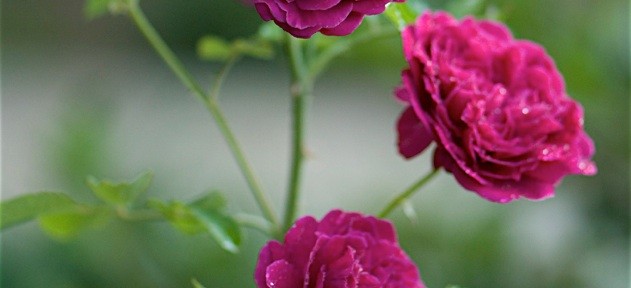This week’s gardening column comes from Jeff’s wife, Leabeth, who teaches English to ninth graders at Nacogdoches High School.
I come home after a day in the classroom to my husband calling out to me, “Did you see Shakespeare in the garden?” I must confess my heart did a little leap. Shakespeare in the garden? How perfect.
Jeff was, of course, referring to our new rose bush that is currently covered in richly scented, crimson blooms, but it got me to thinking what an appropriate name for a rose. Shakespeare, one way or another, belongs in the garden.
Coincidentally, I have been currently teaching one of Shakespeare’s plays to my high school freshmen. He is the perfect subject for the end-of-the-year student who would rather be anywhere than in the classroom. Does it astonish you that the complicated literature of Shakespeare would be the subject of choice at a time when students have their minds on summer vacation? Surprised? You really shouldn’t be. Shakespeare has drama, suspense, comedy, great characters even a 14 year old can identify with and (best of all) he entertains.
That’s why I think Shakespeare belongs in the garden. Those of you who frequent Jeff’s columns, just think how many times he refers to a plant “putting on a show” or describes a bloom as “showy”. Shakespeare is the ultimate entertainer. As I so often remind my students, a Shakespeare play is being performed somewhere in the world every day of the year. And, if you’ll forgive the pun (I know Shakespeare would), his language is always being accused of being too ‘flowery’- as if that were a bad thing.
I love teaching him to students. It’s thrilling every year to watch jaded youth rush into class to be the first to sign up to read a part. I smile as guys and girls alike catch their breath over the tragedy of Romeo and Juliet- not because they are surprised at the outcome (everyone knows it from the start) but because they are drawn in by the drama, the accidental ‘near misses’, the ‘if onlys’.
I’m that way with our garden. I rush to see what new plant Jeff has added to our collection. I still delight over a familiar plant’s bloom or mark my seasonal clock from a well-known scent I catch on the breeze announcing spring is in the air or summer has finally arrived.Shakespeare is in the garden, and it’s blooming. What a great show piece for a landscape.
Jeff tells me that the rose in our garden named for Shakespeare is known as an “English Rose” developed by David Austin. For a number of years, he has been introducing new modern roses into the horticulture world that have an old fashion flair. You might look around for them in the nursery, especially when they have Shakespearean names like ‘Othello” and ‘Prospero’. They are richly scented and, though modern, have an old fashion look about them, like the Bard himself- old world, yet always a present day success.
(Originally published in The Daily Sentinel Nacogdoches, Texas)

